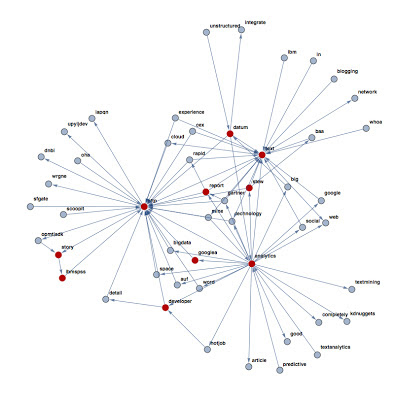Here is snippet of a project I’m working on during my spare time. The project has the aim to gather, provide and represent knowledge in a different way. For the time being, I don’t want to disclose too much info, but the main idea is to leverage my concept of the graph entropy to capture information in a document (or in a data set) to create a new kind of indexer.
One of the outputs of the algorithm is the generation of the mind map.
Experiment
Here is snippet of a project I’m working on during my spare time. The project has the aim to gather, provide and represent knowledge in a different way. For the time being, I don’t want to disclose too much info, but the main idea is to leverage my concept of the graph entropy to capture information in a document (or in a data set) to create a new kind of indexer.
One of the outputs of the algorithm is the generation of the mind map.
Experiment
Through the API provided by Twitter, I downloaded the last 200 tweets containing the hashtag #textanalytics. I processed the tweets and here are the results:
 |
| #textanalytics mind map |
In red have been depicted the first 10 relevant words extracted through the graph entropy criteria.
It’s interesting to notice how the map shows intuitively the links among the words. Of course, the map can be enriched with more links or more relevant words: it’s the user’s choice.
In the next posts I’ll show you how the clustering techniques discussed in former posts can be profitably used to create homogeneous group of words related each others. Stay tuned.
What do you think so far? Let me know in the comments.





